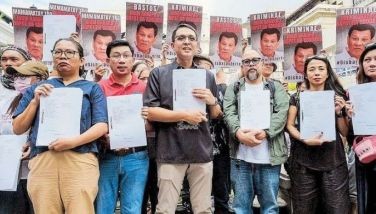Philippine Coast Guard plane keeps watch over Philippine Rise

“The ship and the Islander would serve as the ‘eyes’ in the area as part of our maritime patrol,” Balilo said. facebook.com/PhilippinesFA50/photos
MANILA, Philippines — The Philippine Coast Guard (PCG) now has “eyes” patrolling the Philippine Rise with its Islander plane.
PCG spokesman Captain Armand Balilo yesterday said the plane would be deployed along with multi-role response vessel BRP Suluan to patrol the area.
“The ship and the Islander would serve as the ‘eyes’ in the area as part of our maritime patrol,” Balilo said.
Balilo added Coast Guard commandant Rear Admiral Elson Hermogino received instructions from President Duterte to deploy assets in the Philippine Rise for patrol.
The BRP Suluan was tasked to conduct a weeklong tour of the formerly named Benham Rise until after another PCG ship takes over.
Balilo said the Philippine Rise is a known route for international vessels since it is considered part of international seas. Most likely ships would still be seen passing through the area.
“They would be allowed to pass but they would not be allowed to conduct any illegal activities in the area,” he said.
The presence of the PCG at the Philippine Rise comes at a time when a Chinese research ship was reportedly spotted in the area, and that in 2004 China managed to name five features of the underwater plateau after an unauthorized research trip.
President Duterte then ordered all foreigners intending to conduct research at Philippine Rise to first secure approval from the National Security Adviser (NSA).
The Philippine Rise has generated much interest because scientific surveys indicate the presence of minerals and natural gas in the area.
Duterte, on the other hand, wanted China for a joint exploration of the country’s territorial maritime claims in the West Philippine Sea.
Duterte said China has offered joint exploration in some of the disputed islets and features in the West Philippine Sea.
It’s like co-ownership and it’s better than fighting the Chinese, he said.
Presidential spokesman Harry Roque however explained the President only wanted a joint exploration with China without giving up the country’s territorial and sovereign rights.
Roque added Duterte sees joint exploration as a “practical solution” that would allow Filipinos to utilize natural resources in the area without having to deal with the “contentious, conflicting” claims to the territory.
Roque also cited a Supreme Court ruling where joint explorations with foreign entities are allowed, as long as they comply with the Constitution and are pursuant to a written agreement signed by the President and submitted to Congress.
Roque stressed a joint exploration is legitimate under the Supreme Court as long as there is an agreement between two parties.
Dangerous precedent
A maritime expert however pointed out that a joint exploration with China would set a dangerous precedent.
Jay Batongbacal, director of the UP Institute for Maritime Affairs and Law of the Sea, said one of the areas being considered for “joint exploration” is one that has never been claimed by China.
“Service Contract (SC) 57 is definitely not within the area of the nine-dash line,” Batongbacal said in a Facebook post, referring to the imaginary line that China used to set its claim in almost the entire South China Sea.
“It is completely located in the Philippine extended economic zone/continental shelf that China never previously laid claim to, and even extends into a portion of the Philippine territorial sea and archipelagic waters under our full sovereignty (not mere sovereign rights),” he added.
SC 57 was one of the two areas that Malacañang said it is considering for joint exploration with China. The other, SC 72, is further west and within China’s territorial claim.
Batongbacal said SC 57 should not be under a joint exploration, as it would downgrade the Philippine position.
“It also implies that any and all areas, even uncontested Philippine waters, are open to joint exploration with China, even though China has never asked for this and historically has promoted joint exploration only for the area within the nine-dash line,” Batongbacal said,
“The government appears to be offering all of Philippine waters to joint exploration with China, not just the West Philippine Sea. It seems to be ‘downgrading’ the status of SC 57, i.e. the area 50 kilometers northwest of Busuanga, as being equivalent to an area also disputed by China,” he added.
The UP professor said exploration on SC 57 should be unilateral, and that the China National Offshore Oil Co. (CNOOC) – which has the majority stake in the contract to explore it – should remain a sub-contractor of the Philippine government.
“Exploration under SC 57 is unilateral by the Philippines, not joint, and CNOOC is clearly a sub-contractor of the Philippines under the service contract. As a consortium partner with PNOC (Philippine National Oil Co.) and Mitra (Energy), CNOOC is only acting on behalf of the Philippines,” he said.
Batongbacal also criticized Roque for saying that there can be joint exploration in SC 57 with China.
“This is carelessly incorrect and misleading. SC 57 is not a disputed area, therefore, this is not a case of joint exploration, but rather unilateral exploration by the Philippines carried out by a sub-contractor, one of whom happens to be CNOOC,” he said.
“The Philippines is allowing it because CNOOC has been contracted to do it together with PNOC and Mitra, and therefore acting fully under Philippines control, not because there is no dispute,” he added.
Batongbacal said allowing a joint exploration at SC 57 would elevate the status of CNOOC from being a sub-contractor to a “co-owner” as implied by President Duterte.
“If government leaders cannot even distinguish unilateral from joint exploration, how can it properly protect Philippine rights and jurisdictions?” he asked.
“Unlike SC 72 which is inside the area that China continues to claim (albeit illegitimately from the Philippine standpoint), SC 57 is undisputed and even China implicitly recognizes that it is completely under Philippine sovereignty and jurisdiction,” added the UP professor. –Christina Mendez, Janvic Mateo
Related video:
- Latest
- Trending

































